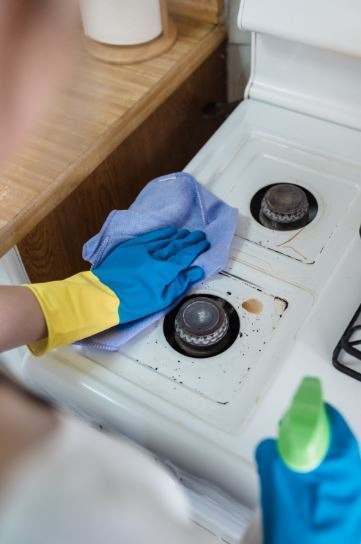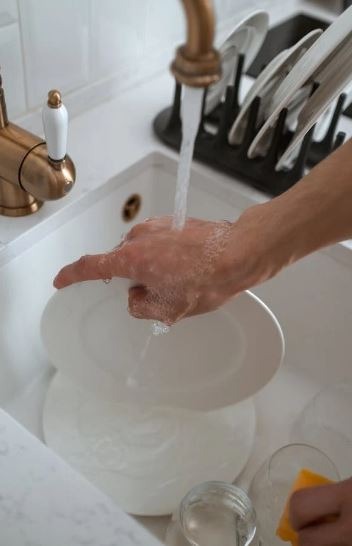Your kitchen goes through a lot in a week between culinary messes, dirty dishes, and ordinary spills. In addition to being one of the busiest rooms in the house, the kitchen is also where you prepare food, making it all the more crucial to keep it clean. Whether it’s a sauce-splattered stovetop or a coffee-stained countertop, it can be difficult to clean every surface in your kitchen daily, especially if you’re on a tight schedule. These kitchen cleaning strategies will save you time degreasing, deodorizing, and sanitizing.
Why must I clean my kitchen every day?
You should make everyday kitchen cleaning a habit for various reasons:
First, the kitchen is typically the center of the home and a popular gathering spot. Since this part of the house is heavily traveled, it will become soiled more quickly.
Second, the kitchen is also where extremely messy activities, such as cooking and eating, occur daily. Since spills and crumbs are easier to wipe up when they are fresh, it is really more efficient to clean the kitchen on a regular basis than to battle with caked-on filth afterwards.
Third, as a place where food is prepared, the kitchen must be maintained clean for health reasons. Germs, bacteria, and other nasties love the kitchen, and without adequate cleaning, your family may be exposed to food-borne illnesses and other unpleasant things.
Finally, you should clean your kitchen daily so that you may genuinely appreciate it. When my kitchen is a mess, I am much more inclined to want to dine out, as I would have to clean it before cooking.
Similarly, if you and your family are going to spend a lot of time in the room, it may as well be clean so you can relax and not worry about slipping on a spill or getting crumbs stuck to your feet.
Tips for Kitchen Cleaning
1. Follow a post-meal routine every time you eat a meal at home
This kitchen cleaning tip entails ensuring that you perform a mini-cleanup after every meal to prepare the kitchen for the next time you will need to prepare food there.
This routine may resemble the following:
- Place all uneaten food, such as leftovers, in food storage containers or in another suitable location.
- Place all dishes in the dishwasher or, if required, wash them by hand.
- Start the dishwasher when it becomes full.
- Clean all pots, pans, and other things used in the preparation or consumption of the meal.
- Dry hand cleaned dishes and pots and put them away, or if you want to let things drip dry, return later to put them away so that the next time you need to use the kitchen there is counter space available.
- Quickly wipe down the kitchen counters, table, and stove top to remove large crumbs and spills.
- Clean your sink of any grease or filth it accumulated while you washed dishes and other kitchen utensils.
- Typically, I simply use the sprayer and the garbage disposal to rinse it.
Some individuals prefer to dry their sink with a towel, but I believe this is a matter of personal preference.
2. Begin by cleaning the kitchen
If possible, refrain from cooking until the kitchen is pretty clean. If your kitchen is already a catastrophe before you begin cooking, you will become depressed and give up after preparing a meal. If you begin with a blank slate, you will be more inclined to maintain it.
3. A location for everything
Have a place for everything, and you understand what I mean!
Instead of having identical items spread throughout the kitchen, it is preferable to have them all in one location. On a huge platter, for instance, I keep all of my non-refrigerated fruit. In addition, I prefer to store my cooking items at one end of my kitchen. This leaves me with an empty stretch of counter space. Glorious!
4. Clean your oven overnight
Ignore auto-cleaning. A high oven temperature is known to set off the fire alarm and leave the kitchen smelling foul. Fill a spray bottle with a solution made from 1/3 cup water, 1/3 cup white vinegar, and 1/2 cup baking soda. When the oven is cool, remove the grate and apply the solution to the interior, avoiding the heating elements. Close the door and retire for 12 hours while the solution does its magic. When you awake, use soapy water and a soft cloth to clean the oven.
5. Keep your garbage disposal smelling pleasant
Few things are as offensive as an odorous garbage disposal. Use one of our favorite kitchen sink cleaning hacks, lemon ice cubes, to rectify the situation. To make them, simply combine lemon slices, rock salt, and water in an ice cube tray. Once the ice cubes are frozen, drop them down the drain and run the garbage disposal until the ice is gone. The rock salt cleanses the blades, while the ice assists in removing any dirt and grime. The lemon helps maintain the sink’s pleasant aroma.
6. Dry hand-washed dishes in the dishwasher
Use your dishwasher’s empty racks to dry your hand-washed dishes rather than a dish rack, which takes up too much valuable counter space. Your dishwasher will accommodate more than a dish rack, so you can quickly clean a sink full of dishes that require hand washing.
7. Utilize a potato to clean rusted cast iron
This method can also be applied on other rusty objects. Here is how it operates: The rusted region can be removed by slicing a potato in half, dipping the cut end in dish soap or baking soda, and rubbing it over the affected area. If the potato’s end becomes slick, chop it off and dip the new end. Repeat until the rust is eliminated!
8. Use wax paper to maintain the cleanliness of cabinet tops
Consider coating the surface between your upper cabinets and ceiling with wax paper if there is a gap. The paper attracts dust and grime like a magnet. It can be swapped out a few times a year, and it’s far easier than cleaning the cabinets by hand. You may also use newspaper, which decomposes more quickly in landfills.
9. Wash any dishes necessary to clean the sink
In a tidy kitchen, it goes without saying that a sink full of dirty dishes has no place. Even if the rest of the kitchen is clean, dirty dishes in the sink will give the impression that it is untidy. If your sink has a garbage disposal, turn it on prior to washing the dishes. Use a drop of dishwashing liquid and scrub the dishes clean, or, if you own a dishwasher, run it at the end of each day. Ensure you load it correctly and select the appropriate cycle.
10. Sweep and mop floors
With food splatters, crumbs, and footprints from everyone entering and exiting, kitchen floors are guaranteed to become filthy quickly and require the same cleaning care as counters, tables, and appliances. It makes the most sense to do it last, as crumbs can contaminate the floor while the countertops are being cleaned. Not only will sweeping, vacuuming clean the floor at the end of the day make the kitchen appear and feel cleaner, but it will also eliminate any food particles that could attract pests.
Conclusion
The kitchen is the gathering place for our families, and many individuals gravitate toward spending time there. Consistent maintenance may appear to be an annoyance, but it is essential and can help you avoid a daunting task in the future. Following a simple daily cleaning regimen can easily become second nature, and you will be grateful later when you are not forced to deal with months’ worth of accumulated crumbs and dried-on food splatters during a major clean you finally completed. In addition, maintaining a clean area where you like cooking, eating, and spending time contributes to the health and happiness of your family.





